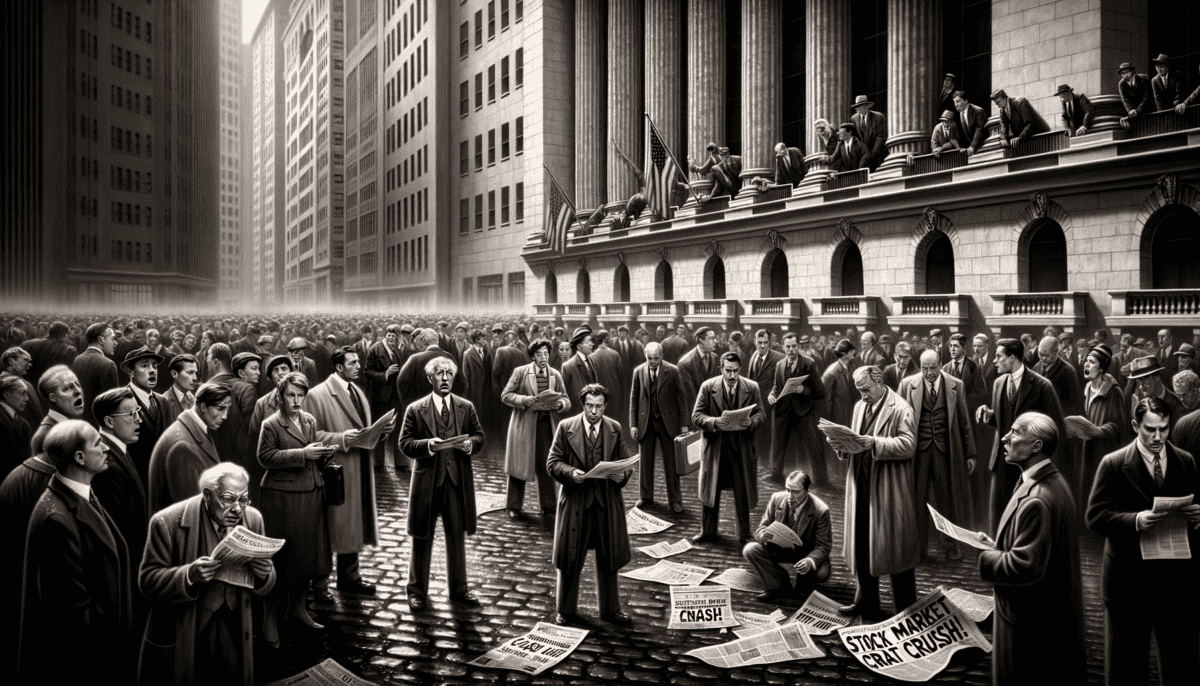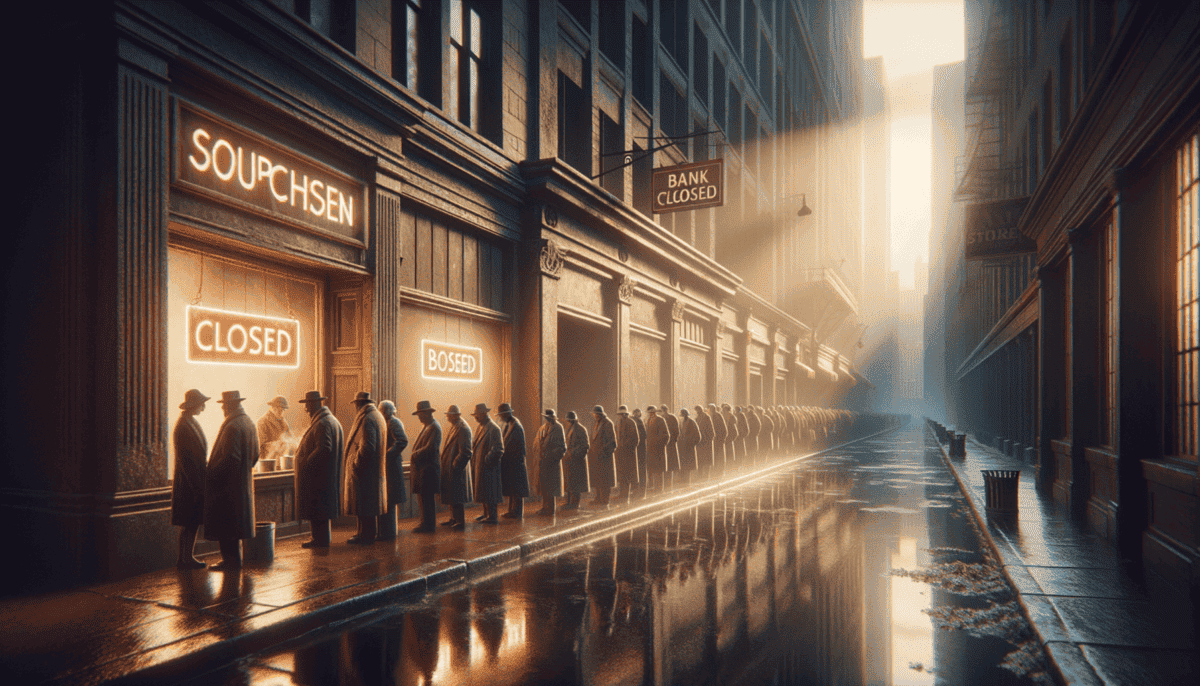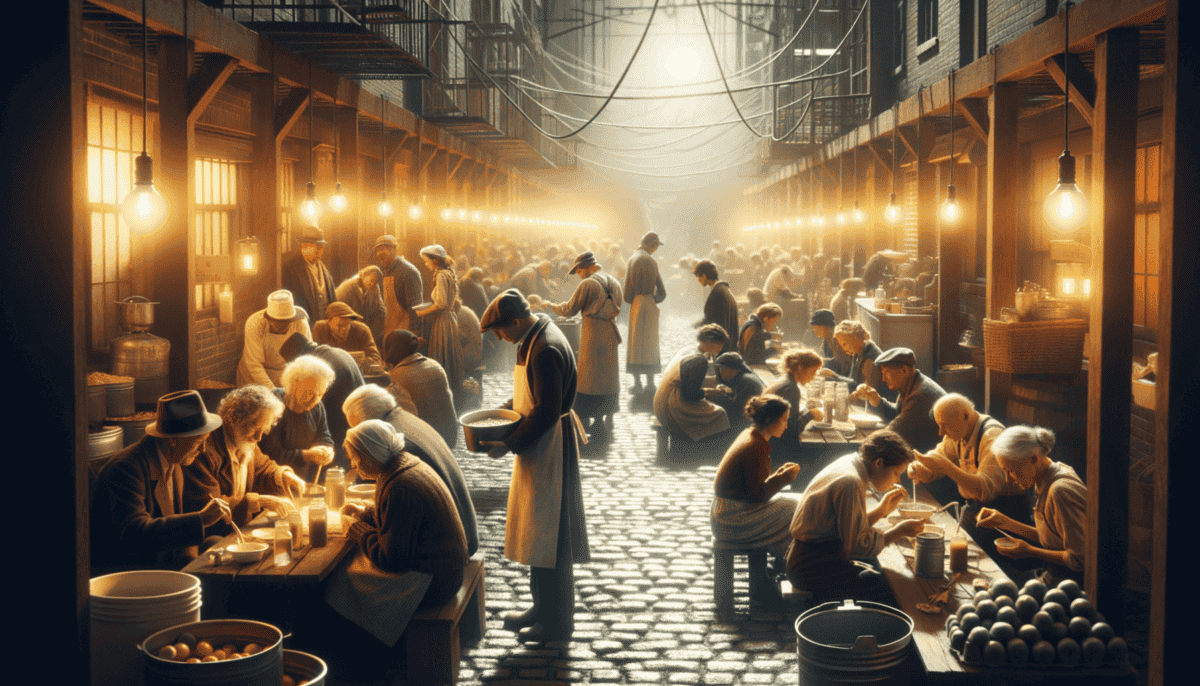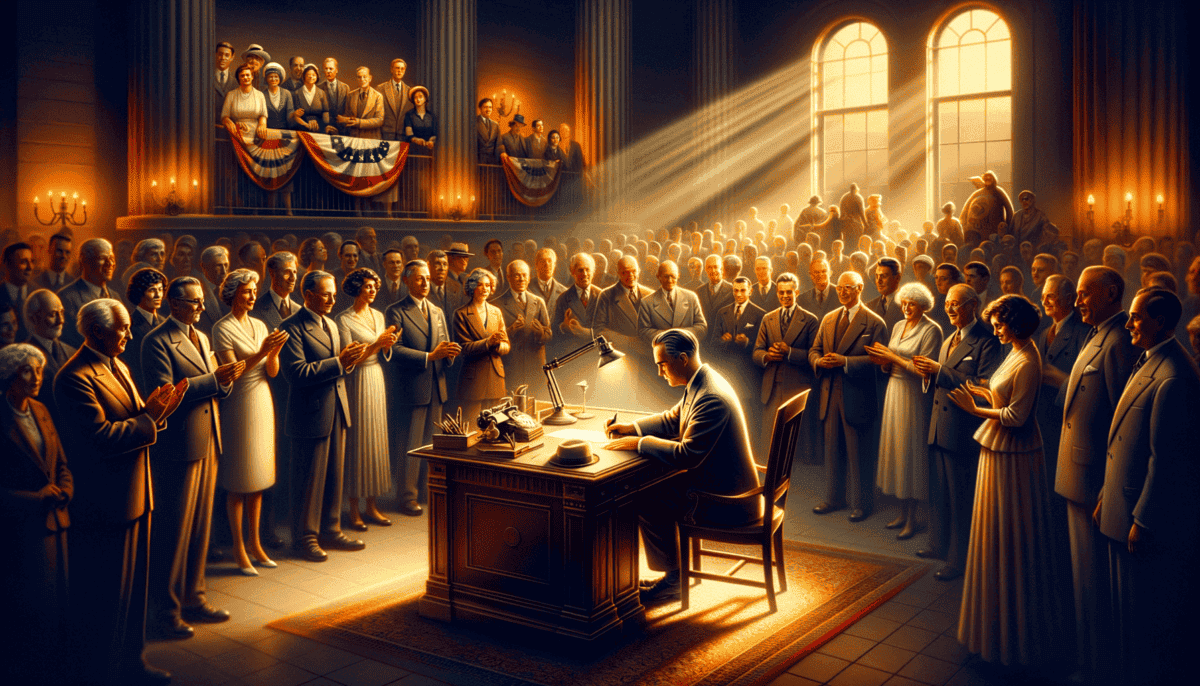A World of Endless Fun
Little Tommy pressed his nose against the toy store window. Inside, a shiny red wagon sparkled under the lights. It was 1928, and everywhere you looked, people were buying new things. ️
"Can we get it, Mom? Please?" Tommy bounced on his toes.
His mother smiled, pulling out her store credit card. "Of course, sweetie. Everyone's getting nice things these days!"
Down the street, Mr. Johnson was telling everyone about the stock market. "It only goes up!" he said, waving his newspaper. "I bought more stocks yesterday. Soon I'll be rich!"
But old Mr. Peters, who owned the grocery store, wasn't smiling. He remembered harder times. "People are spending money they don't have," he whispered to his cat. "They're buying things with something called 'credit' instead of real money."
The Happy Times
Every weekend brought new parties. Ladies wore sparkly dresses, and jazz music played on brand new radios. Cars zoomed down the streets – more than ever before!
Here's what made the 1920s special:
• New inventions like radios and cars
• Stores letting people buy now and pay later
• Everyone thinking they could get rich quick
• Big parties and fun times
• People feeling like money would never run out
Storm Clouds Growing
But not everything was as happy as it seemed. Tommy's dad frowned at the bills piling up on their kitchen table. More and more people were buying things with borrowed money.
"Martha," he said to Tommy's mom, "maybe we should save some money instead of spending it all."
Martha laughed. "Don't be silly! The good times will last forever!"
Warning Signs Nobody Saw:
Banks were giving out too many loans. Farmers weren't making enough money. Factories had made too many things that nobody was buying.
A Strange New Way of Living
People started playing a dangerous game with stocks. They would:
- Borrow money from the bank
- Buy stocks
- Wait for stocks to go up
- Sell stocks to make money
- Pay back the bank and keep the extra
"It's like magic!" said Mr. Johnson. But old Mr. Peters shook his head. "Nothing magical lasts forever," he said quietly.
Tommy didn't understand why his parents kept buying things they couldn't afford. He just knew his new red wagon was fun to play with. But soon, the happy times would end in a way nobody expected.
That night, as stars twinkled over the city, old Mr. Peters looked out his window at all the bright lights and fancy cars. "A storm is coming," he said to his cat. "I just hope people are ready for it."
The music played on, the parties continued, and most people kept spending money they didn't have. But dark clouds were gathering, and the biggest money trouble anyone had ever seen was just around the corner.
Little did Tommy know that his shiny red wagon would soon become one of his family's most precious possessions – for reasons nobody could have imagined in those happy, carefree days of 1928.
The Day The Money Disappeared
The morning of October 29, 1929, started like any other day. Tommy was eating breakfast when he heard his father gasp at the newspaper.
“The stocks are falling!” his father shouted. “Everyone’s selling!”
Panic in the Streets
Outside, people were running to the bank. Mr. Johnson wasn’t smiling anymore. His face was white as chalk.
“My money!” he cried. “All my money is gone!”
Tommy watched from his red wagon as long lines formed outside the bank. People were scared their money wasn’t safe.
“Please, let me take out my savings!” begged Mrs. Wilson, the school teacher.
“I’m sorry, ma’am,” said the bank manager. “There’s no money left.”
When Dreams Broke
Things people had bought with borrowed money now caused big problems:
• Houses they couldn’t pay for anymore
• Cars they had to sell
• Fancy clothes they couldn’t afford
• Toys that seemed silly now
• Dreams that disappeared like morning fog
Everything Changed
Tommy’s mom stopped using her credit cards. The toy store where Tommy got his wagon closed down. Even rich people became poor overnight.
“What happened to all the money?” Tommy asked his father.
“Son,” his father said, patting the red wagon, “it was never real money. We were all pretending we were richer than we were.”
Old Mr. Peters Was Right
The grocery store owner stood in his doorway, watching people hurry past. “I warned them,” he told his cat. “But nobody wanted to listen.”
He started letting people buy food on trust, writing their names in a special notebook. “We have to help each other now,” he said.
| Before Black Tuesday | After Black Tuesday |
| People spent lots of money | People saved every penny |
| Everyone bought stocks | Many lost everything |
Finding Hope
That evening, Tommy sat in his red wagon, watching the sunset. The streets were quieter now. No more parties or jazz music.
“At least we still have each other,” his mother said, hugging him close. “And your wagon to carry our groceries from Mr. Peters’ store.”
People started helping their neighbors more. They shared what little they had. Even though times were hard, they found strength together.
As night fell over the silent city, Tommy realized something important: real treasure wasn’t in banks or stocks – it was in helping each other through hard times.
But darker days were still ahead, and Tommy’s red wagon would soon be used for things nobody could have imagined during those scary hours of Black Tuesday.
When Hope Got Hard to Find
Tommy’s red wagon squeaked as he pulled it down Main Street. The stores that once sparkled with new things now had dark windows.
Empty Places
“Gone out of business” signs hung everywhere. Mr. Wilson’s candy shop, where Tommy used to spend his nickels, was empty. The bakery where his mom bought fresh bread had closed too.
“Where did everyone go?” Tommy asked his mother.
“They lost their jobs, sweetie,” she replied softly. “Just like your father.”
The New Normal
Tommy noticed changes in his own home:
• No more meat for dinner
• Patches on his clothes
• Empty cookie jar
• Cold rooms to save heat
• Quiet meals without dad
His father spent all day looking for work. He came home each night with slumped shoulders. “Maybe tomorrow,” he would say. But tomorrow kept bringing more bad news.
Helping Hands
Old Mr. Peters still ran his grocery store. He started a special shelf called “Share What You Can.” People who had extra food left it there for others who had none.
Tommy used his wagon to deliver groceries for Mr. Peters. Sometimes people paid with eggs from their chickens. Other times they just said “thank you” with tears in their eyes.
The Day the Bank Closed
One morning, Tommy saw Mrs. Wilson crying outside the bank. The doors were locked with a big chain.
“My savings,” she sobbed. “All my teaching money was in there.”
| Before | Now |
| Full dinner tables | Simple meals |
| Busy stores | Empty buildings |
Moving Day
Families started leaving town. The Browns packed their car with everything they owned. “We’re going to California,” they said. “There might be work there.”
Tommy watched his best friend Billy wave goodbye from the back window. His red wagon felt heavier that day, even though it was empty.
Finding Ways
Mom started a vegetable garden in their backyard. “We’ll grow our own food,” she said, showing Tommy how to plant seeds.
Dad fixed broken things for neighbors. Sometimes they paid him with vegetables or eggs. Other times with just a grateful smile.
Tommy used his wagon more than ever now. He collected metal scraps to sell and delivered vegetables from his mom’s garden to elderly neighbors.
“Your wagon’s doing important work,” Mr. Peters told him. “It’s helping people survive.”
As summer turned to fall, Tommy understood that this wasn’t just a bad dream that would go away. But his little red wagon kept rolling, carrying hope from house to house in a town that needed it more than ever.
Finding Strength Together
The soup kitchen line stretched around the block. Tommy pulled his red wagon behind Mrs. Johnson, who could barely stand after walking so far.
Daily Bread
“Here, Mrs. Johnson, sit on my wagon,” Tommy offered. “We can wait together.”
“Bless your heart, child,” she smiled weakly. “You remind me that good still exists.”
Working Together
Everyone pitched in what they could:
• Mrs. Baker shared her bread-making skills
• Mr. Green brought vegetables from his farm
• Tommy’s mom mended clothes
• Dad fixed broken chairs
• Kids helped serve food
The kitchen hummed with activity. The smell of vegetable soup filled the air as people talked and shared what little they had.
Moving West
More families packed up for California. Dust storms had ruined many farms, forcing people to look for work elsewhere.
Tommy watched as the Martinez family loaded their truck. “Take care of my baseball cards,” his friend Miguel said, handing him a wrapped bundle.
Creative Solutions
| Old Ways | New Ways |
| Buying clothes | Trading and mending |
| Store-bought food | Community gardens |
People got creative with what they had. Mom turned old curtains into dresses. Dad started a tool-sharing group where neighbors borrowed what they needed.
The Library Adventure
Miss Reed, the librarian, started story time at the soup kitchen. “Books feed our minds,” she said, “while soup feeds our bodies.”
Tommy used his wagon to help Miss Reed carry books. Sometimes, he read to younger kids while they waited in line.
Small Victories
Dad finally found work helping build a new road. It wasn’t much money, but his smile returned. “Every little bit helps,” he said.
The community garden grew bigger. People shared what they grew, creating a small farmers’ market where money wasn’t always needed.
Tommy’s wagon now carried vegetables, books, tools, and hope between neighbors. He realized that even though times were hard, people were stronger together.
As winter approached, the soup kitchen lines stayed long, but nobody stood alone anymore. They had learned that sharing made everyone richer in ways that money couldn’t buy.
A New Path Forward
President Franklin D. Roosevelt’s voice crackled through Tommy’s family radio. Everyone gathered close to listen.
Hope on the Radio
“My friends,” the president said warmly, “we are going to help each other build a better America.”
Tommy watched his parents’ faces light up with hope for the first time in months.
Safe Money
“What’s different now, Dad?” Tommy asked.
“The government is making sure banks keep our money safe,” Dad explained. “No more losing everything like before.”
People started trusting banks again. Mr. Wilson reopened his savings account, and others followed.
New Jobs for Everyone
Big changes came to town:
• New roads being built
• Parks getting fixed
• Schools being painted
• Libraries expanding
• Bridges under construction
Dad got a steady job building a new park. Mom joined a sewing program making uniforms. Even Tommy’s older sister found work at the new community center. ♂️
Taking Care of People
Grandpa smiled when he got his first Social Security check. “Now I can help with groceries,” he said proudly.
| Old Ways | New Help |
| No help when old | Social Security checks |
| No job support | Work programs |
Growing Together
The community garden became a real farm project. More people learned to grow food, and the government helped them sell it.
Learning New Things
Miss Reed’s library got bigger. “The government sent us more books!” she announced excitedly.
Artists painted beautiful pictures in the post office. Musicians played concerts in the park. The whole town felt more alive.
Better Rules
“The stock market has new rules now,” Dad explained to Tommy. “It’s like having a referee in a baseball game – making sure everyone plays fair.”
Banks had new rules too. They couldn’t gamble with people’s savings anymore. Everyone felt safer knowing their money was protected.
Coming Together
Tommy’s red wagon now carried groceries from real stores again. The soup kitchen was still open, but fewer people needed it.
“Things are getting better,” Mom said, hanging fresh curtains she bought with her own earnings. “But we won’t forget what we learned about helping each other.”
The town had changed. People worked together more. They understood that everyone needed help sometimes, and that’s okay. The future looked brighter, one small step at a time. ✨
Building a Better Tomorrow
Tommy sat on his front porch, watching his neighborhood buzz with new life. The streets were clean, stores were open, and people walked with their heads held high.
Looking Back, Moving Forward
“Remember when we thought things would never get better?” Mom asked, joining Tommy on the porch swing.
Smart Money Choices
At school, Tommy learned about saving money in a new class. His teacher, Mrs. Martinez, made it fun.
“Save a little bit every week,” she taught them. “It’s like planting seeds that grow into strong trees.”
Working Together
The town had changed in wonderful ways:
• People shared more
• Neighbors helped neighbors
• Everyone saved some money
• Communities stayed strong
• Kids learned about money
Safe and Sound
Dad showed Tommy his bank book proudly. “See this stamp? It means our money is protected by the government now.”
New Ways to Work
| Then | Now |
| No job safety | Worker protection |
| No retirement help | Social Security |
Global Changes
“The whole world learned from what happened,” Tommy’s teacher explained. “Countries started working together more.”
Helping Hands
The community center stayed open. “We’ll always help those who need it,” said Miss Reed, now running reading programs there.
Lessons Learned
“What did we learn from all this, Dad?” Tommy asked one evening.
“We learned that money isn’t everything,” Dad replied. “Friends, family, and helping others matter most. And we learned to be careful with our money.”
The Future Ahead
Tommy’s town was different now. Better in many ways. People were smarter about money. They saved more and helped each other more.
The library had a new sign: “Learn from yesterday, live for today, hope for tomorrow.” ⭐
A New Chapter
One morning, Tommy found his old red wagon in the garage. He remembered using it during the hard times. Now it sat next to his new bicycle – a symbol of better days.
“Maybe I’ll keep the wagon,” he thought. “To remember how we all helped each other.”
As Tommy rode his bike through the bustling streets, he knew his town would never forget the lessons they learned. They were ready for whatever the future might bring, facing it together, stronger than ever.






